America did not invent human rights.
In a very real sense, it is the other way around.
Human rights invented America.
— Jimmy Carter
Almost two years ago, upon the announcement former president Carter would “spend his remaining time at home with his family”, the Carter Center announced he had “decided to… receive hospice care instead of additional medical intervention”. That announcement in early 2023 came just before the American public holiday of Presidents’ Day and it was a fitting moment to announce the former president’s decision. Despite this decision, Jimmy Carter still stayed among us for almost two more years.
It is incumbent, even necessary, for us to take a long look at his life and career, now that he has passed into history.
The Carter Center, together with the Carter Presidential Library, has been the former president’s headquarters for his writing, his peacemaking, and his public health efforts for decades. (Upon hearing the news of the former president’s decision, the author sought out a musical evocation of that decision in Barbara Hendricks’s singing of the great African American spiritual, Steal Away. Listen here while you read the rest of this story:
https://www.youtube.com/watch?v=7T_P5vJWW_k
As an aside, some years ago, I had used the Carter Presidential Library at the centre in Atlanta to do some archival research, like so many others have done over the years. The centre holds a wealth of resources on the decisions made by the president and his administration, and the staff have made it their mission for individual researchers to access the full range of those records – even suggesting materials unasked for that would be relevant.
Close to his roots
Carter was that most unusual of 20th century presidents — perhaps even uniquely so. He maintained his roots in the small town of Plains, Georgia, a few hours’ drive south of big-city Atlanta, for the entirety of his life. Until their passings he and his wife lived in the home they had built for themselves, back in 1961. His family business had been peanut farming and peanut warehousing, and he returned to it after naval service as a nuclear engineer and officer.
Carter had entered the US Naval Academy at Annapolis in the early years of World War 2 and soon after his graduation he found his niche in Rear Admiral Hyman Rickover’s elite team as they set about creating a nuclear-powered submarine fleet that now rules the oceans.
Upon leaving the military he returned to his and his wife’s native Georgia. After a while, though, in Plains, he began to dip his toe carefully into state politics, prior to running for and then winning his state’s governorship in 1970. Georgia’s immediately previous governor had been Lester Maddox, the crude-talking, crowd-baiting arch-segregationist – a restaurateur who had infamously barred African Americans from being seated by his brandishing a long, wooden axe handle at them. Maddox had won the lieutenant governorship, running independently, in the same election in which Carter had won the governorship.
Georgia, as with much of the Deep South in that period, was in the throes of America’s civil rights struggle, and many among its white population remained deeply resistant to the social, economic and political changes that were taking or about to take place in their region. While Carter was no civil rights “warrior” his electoral victory was seen as a vindication of the idea that there was a growing tide of acceptance of political change on the part of many white citizens in the Southern states.
Watergate aftermath
Sometimes, however, fate takes over the arc of a person’s political career. In the early 1970s, American politics was dominated by the tragic end game of America’s involvement in Vietnam, by the domestic political protests over that war, and, then, by the revelations of the corruption and lawbreaking central to Richard Nixon’s presidency and his re-election committee machinery – which collectively became known as “Watergate”, from the name of the hotel/office building where the core crime took place.
But the unelected presidency of Gerald Ford, beginning in 1974 due to Nixon’s resignation, proved insufficient to tamp down the national pain from Watergate. In that set of circumstances, Carter took a gamble to push himself onto the national stage, joining a large field of Democrats eager to reclaim the White House after those Republican scandals. Initially he was seen as a most unlikely presidential candidate. His inexperience in politics generally, a virtual lack of national exposure, and his reality of being a figure from the Deep South (no longer the region for presidents as it had been in the days of the country’s founding fathers) were cited as minimising his chances against more experienced figures.
But Carter proved to be an earnest, untiring candidate in the primary races, and, increasingly, he was embraced as the fresh face (and bearer of an unblemished record) crucial for the general election. His prospects became stronger after his opponent, President Gerald Ford, uttered puzzling gaffes about foreign policy in the nationally televised presidential debates.
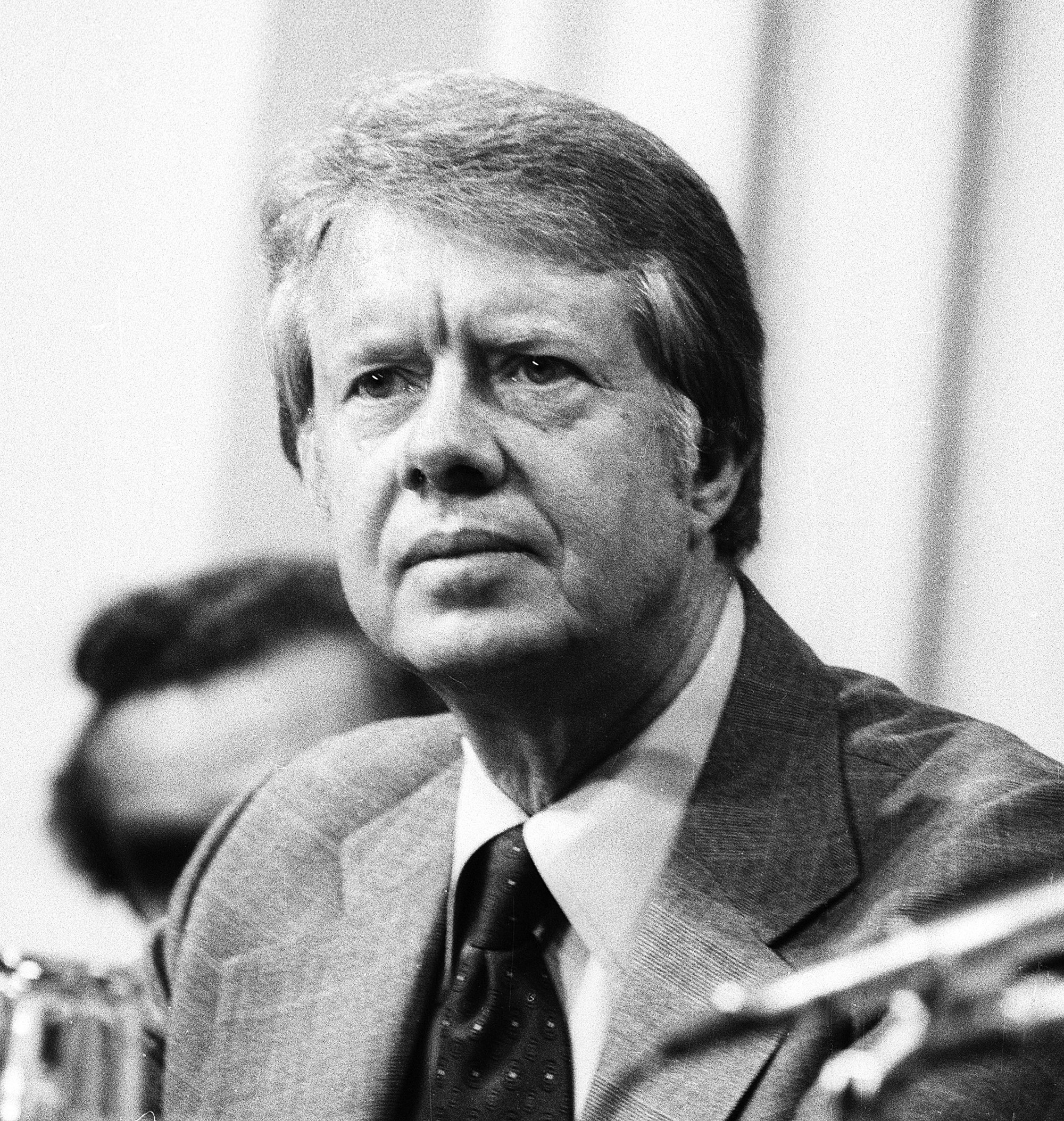 President Jimmy Carter at a European Economic Community Conference in London in May 1977. (Photo: Tom Wargacki / WireImage)
President Jimmy Carter at a European Economic Community Conference in London in May 1977. (Photo: Tom Wargacki / WireImage)
Citizen president
During the campaign, Carter had promised Americans he would never lie to them (putting himself in obvious, yet unspoken, comparison with the disgraced Nixon who had done just that, repeatedly). Once elected, in a demonstration that the nation had entered a new era and that Carter would be a citizen president and servant of the nation, rather than elected nobility in an imperial presidency, he, his wife, and their nine-year old daughter, Amy, walked on foot between the Capitol and the White House along Pennsylvania Avenue, on to the reviewing stand to witness the inaugural parade. That simple act helped symbolise a sense of national renewal after the years of increasingly appalling leadership under Nixon. (Watch that unscheduled moment here:
https://www.youtube.com/watch?v=iKvLcQ32xrM
In the years after the Carter presidency ended after just one four-year term of office, with electoral defeat in the wake of some difficult economic circumstances and the Iranian hostage crisis, for many the refrain has become that, as president, Carter had been something of a failure, at least compared with his unique post-presidency. However, such a judgement is overly influenced by the effects of those two circumstances.
A broader recalibration is overdue, especially now that Carter has passed into history. Stu Eizenstadt, a long-time senior official wrote on Monday, 30 December’s Washington Post: “Conventional wisdom holds that Jimmy Carter was a failure as a president, redeemed only by his philanthropy and efforts to promote democracy in his post-presidential years. This is palpably wrong. Carter’s accomplishments at home and abroad were more extensive and longer lasting than those of almost all modern presidents.”
Carter’s biographer, Jonathan Alter, had written about the former president following his announcement about entering home hospice care: “For decades after he was crushed in the 1980 presidential election, Jimmy Carter was defined as a loser. But as he enters hospice at age 98, he has – by any standard – won at life. He is the longest-lived American president, the longest married (77 years, and happily), and – especially if you look at his whole career – among the most accomplished and productive figures of our era.”
Alter added: “When I first began researching his epic American life in 2015 [for a biography of him], I was struck by the ubiquity of the easy shorthand on him – bad president; great former president. Even now, everyone from political scientists to the average person on the street will express this idea as if it’s an established fact. The problem is, the widespread conventional wisdom on Carter is mostly wrong.”
By contrast, Alter wrote, “Carter was a hugely underrated president – a political failure but a substantive, visionary success. And he was a slightly overrated former president, despite essentially redefining that role. In the four decades since leaving office in 1981, he achieved several important things (especially in global health) but had much less power to change lives than he did while in office.
“Carter has led an extraordinarily colorful life…[and he] was connected to almost all of the major events and movements of the 20th Century. And the issues he tackled during his post-presidency – global health, democracy promotion and conflict resolution – are the cutting-edge challenges of the 21st.”
Civil rights struggle
It is true that Carter did not come immediately to the civil rights struggle then convulsing much of the nation. While he was on the Sumter County School Board, the historic Supreme Court’s ruling – Brown v Board of Education – that had ordered school desegregation had not even been a part of that school board’s agenda. But, as Alter notes, once elected, “Just moments after being sworn in as governor, Carter in his inaugural address announced that the time for racial discrimination was over. Many white supporters felt betrayed, while Black Georgians left the inauguration shocked but hopeful.
“Carter then began using the second half of his life to make up for what he did not do in the first half – namely stand up for civil rights. He integrated Georgia state government and hung Martin Luther King’s portrait in the state capitol, while also amassing a highly impressive environmental record and challenging Georgia’s criminal justice system.”
In thinking about Carter as president, at a farewell dinner just before Carter was about to leave office, his vice-president, Walter F Mondale, whose job Carter turned from a political joke punchline into a position of real responsibility, toasted the Carter Administration: “We told the truth. We obeyed the law. We kept the peace.” Carter later added a fourth accomplishment to that roster of successes: “And we championed human rights.”
This latter point had given real hope to many – especially among America’s diplomats, as Carter came into office. As the State Department’s Office of the Historian explained: “The election of Democrat Jimmy Carter as President in 1976 brought a new emphasis [on human rights], based on Carter’s personal ideology… In 1977, Carter said, ‘For too many years, we’ve been willing to adopt the flawed and erroneous principles and tactics of our adversaries, sometimes abandoning our own values for theirs. We’ve fought fire with fire, never thinking that fire is sometimes best quenched with water. This approach failed, with Vietnam the best example of its intellectual and moral poverty. But through failure we have now found our way back to our own principles and values, and we have regained our lost confidence.’
“Carter refused to continue the past practice of overlooking the human rights abuses of our own allies, and was particularly tough on South Korea, Iran, Argentina, South Africa and Rhodesia (Zimbabwe). He also ended more than 30 years of US political and military support to one of Latin America’s most abusive leaders – President Somoza of Nicaragua.”
As Carter himself explained it: “Our policy is based on an historical vision of America’s role. Our policy is derived from a larger view of global change. Our policy is rooted in our moral values, which never change. Our policy is reinforced by our material wealth and by our military power. Our policy is designed to serve mankind.”
During his time in office, this new emphasis on human rights also led to a congressional requirement for an annual “full and complete report” on human rights practices around the world. The first such report came out in 1977 and covered 82 nations. Now, however, its coverage extends to virtually every nation on the globe and this annual volume has become a standard reference for governments and human rights campaigners globally.
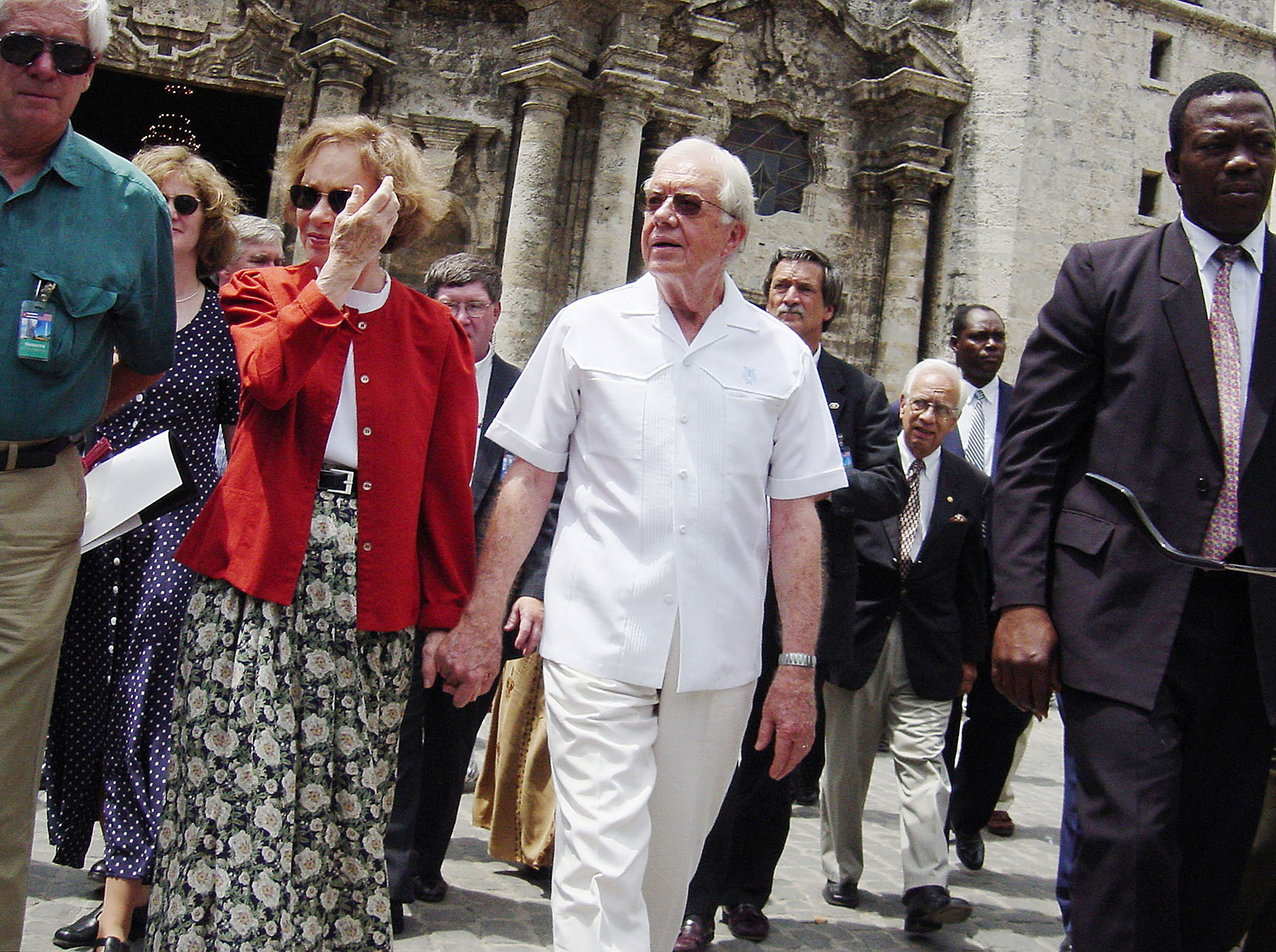 Former US president Jimmy Carter and his wife, Rosalynn, walk towards the Centre of Old Havana in Cuba on 12 May 2002. (Photo: Jorge Rey / Getty Images)
Former US president Jimmy Carter and his wife, Rosalynn, walk towards the Centre of Old Havana in Cuba on 12 May 2002. (Photo: Jorge Rey / Getty Images)
Inventorying other Carter foreign policy initiatives, one must also add that his administration completed the full normalisation of relations with China in 1979, and his administration also persuaded the Senate to consent to a treaty that set out a phased, 20-year transfer of sovereignty over the Panama Canal to direct Panamanian control. This agreement eventually was passed despite serious objections from Republicans – and some Democrats – over its potential negative impact on national security, as well as concerns about the capacity of Panamanians to run the vital transportation link effectively. (Now, of course, the incoming US president is trash-talking that agreement, despite the fact that the canal has been run successfully for decades under its new managers.)
Moreover, the Carter administration also reached agreement with the Soviet Union for a new nuclear arms control agreement, the SALT II agreement. (While it had not been formally ratified by the US Senate because of opposition over the Soviet invasion of Afghanistan, both nations had, unofficially, adhered to it for years.)
Of course the most astonishing accomplishment of his time in office was a personal, unrelenting engagement in hands-on negotiations that produced the Camp David Peace Accords between Israel and Egypt. This outcome has transcended the Carter years by decades and this still-extant agreement ended the long-running lethal hostility between two nations that had resulted in four shooting wars since 1948.
It was a signal achievement, even if it obviously has not generated universal peace between Israel and all of its Arab neighbours and near-neighbours. Even for Israelis who have not felt the warmth of Carter’s attentions, following a book he wrote, titled Palestine: Peace Not Apartheid, most likely they will still agree that the Camp David Accords should trump any qualms about Carter’s positive legacy for Israelis. Averell Harriman, the longtime American diplomatic envoy whose service reached back as far as Franklin Roosevelt’s presidency, called Camp David “one of the most extraordinary things any president in history has ever accomplished”.
But of course there was also the Iranian revolution and the damage the ensuing hostage crisis delivered to the Carter presidency. Since the mid-1950s, the Shah’s government in Iran had increasingly been seen as an important ally of the US, both for its oil exports as well as its military capabilities in a volatile part of the world. Dissatisfaction with that government and its frequently repressive nature, however, generated a revolt by students on the left, as well as by supporters of a theocratic state to be led by a religious figure, the soon-to-return-from-exile in France, Ayatollah Khomeini.
Once the revolution took hold and the Shah was driven from power, the new government issued a warning to the US about offering any assistance to him. The Carter administration, however, eventually agreed to allow him to enter the US for medical treatments before he took up a final exile in Egypt.
In response, groups of Iranian students stormed the US Embassy in Tehran and held much of its staff there as hostages for 444 days, only relenting and releasing them as Carter’s successor, Ronald Reagan, was about to be sworn in as president. Earlier, a helicopter-borne rescue mission had ended disastrously due to equipment failures. The net effect of such events generated an image of a US unable to protect its interests or its personnel assigned abroad.
But, in contrast to all the criticisms that Carter had weakened the country’s defence posture, Alter notes that in the midst of the Cold War, Carter actually “sharply increased defence spending and developed the B-2 stealth bomber and other hi-tech weapons that years later helped win the Cold War. After the Soviet Union invaded Afghanistan in 1979, Carter was forced to withdraw the SALT II Treaty from the Senate (though its terms were respected by both nations). Carter’s decisions to boycott the 1980 Summer Olympics in Moscow and impose a grain embargo on the Soviet Union were ineffective and, eventually, hugely unpopular.” Still, sometimes leaders must make decisions that are not popular and a president must be certain within his or her own mind that such decisions are the right thing to do, despite public opinion.
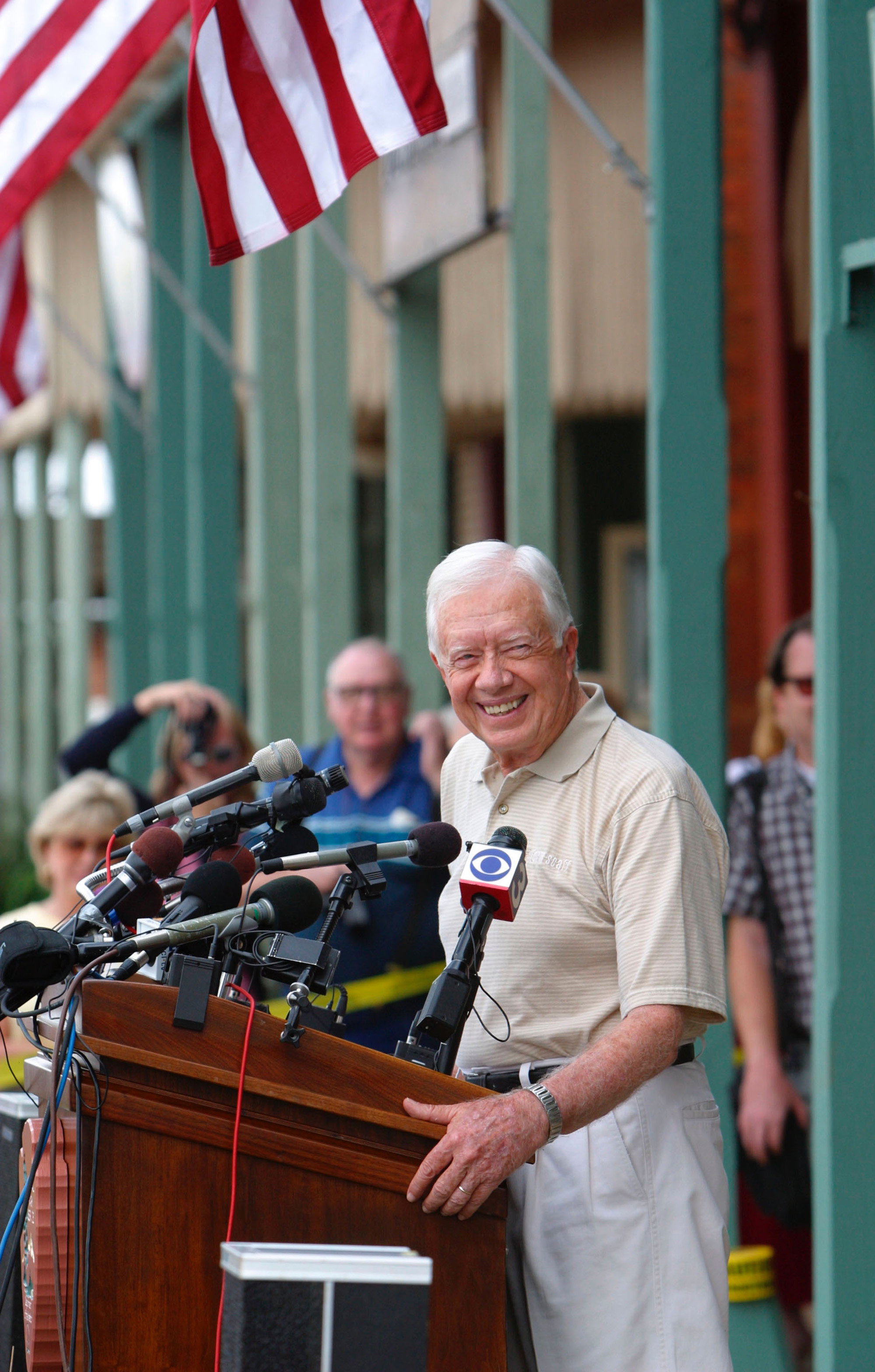 Former US president Jimmy Carter speaks at a news conference in Plains, Georgia, on 11 October 2022. (Photo: Ken Krakow / Getty Images)
Former US president Jimmy Carter speaks at a news conference in Plains, Georgia, on 11 October 2022. (Photo: Ken Krakow / Getty Images)
Domestic policy
In domestic policy, while he was unsuccessful in getting Congress to enact major welfare, tax and healthcare reforms, his presidency did see passage of more domestic legislation than any postwar president, save for Lyndon Johnson. Such measures included creation of the two national departments of education and energy, as well as the Federal Emergency Management Agency.
His efforts also replaced tokenism with a more genuine racial and gender diversity in the civil service and the federal judiciary; and he pushed through curbs on banks’ ability to “redline” (disinvest in) black neighbourhoods. In addition, his administration initiated the first federal government employee whistle-blower protections and the first watchdogs (inspectors-general) to investigate waste, fraud and mismanagement.
On a more granular level, just as he had done while governor in Georgia, as an enthusiastic early new technology adopter, Carter installed solar panels on the roof of the White House (although they were later removed by Reagan), pushed for the first federal funding for green energy, the first fuel economy standards for autos, the first incentives for public utilities to use renewable energy, and the first federal requirements for toxic waste clean-up. Through the Alaska Lands Bill, the Carter administration doubled the size of the national park system.
However, the Carter administration took heat for the very high interest rates carried out by his appointee, Paul Volcker, as chair of the Federal Reserve Board. (At one point, the author was negotiating to purchase a townhouse in Washington, but was dissuaded by an interest rate on the mortgage bond that hovered around 17% per annum.) In Carter and Volcker’s defence, despite the financial pain on many individuals, that strong monetary policy eventually did break the back of double-digit inflation, although Carter’s successor, Reagan, ended up getting most of the credit. The Carter presidency also took considerable heat for petrol shortages that sharply drove up fuel prices, even though such petrol price rises were substantially beyond the Carter administration’s control.
There were, meanwhile, other real clouds on the political horizon for Carter as well. As the nomination process for a second term drew nearer, his chances were significantly wounded by a challenge to his nomination by Senator Ted Kennedy on behalf of the liberal wing of the Democratic Party.
Moreover, as the Iran hostage drama continued, public opinion shifted against him from that political challenge, in addition to his inability to reunite his by-then-fractured party. Ultimately, however, after that abortive helicopter rescue mission, his popularity weakened yet further. In the only 1980 presidential candidates debate, when Reagan asked the television audience at home to consider, “Are you better off than you were four years ago?” Carter’s re-election chances evaporated.
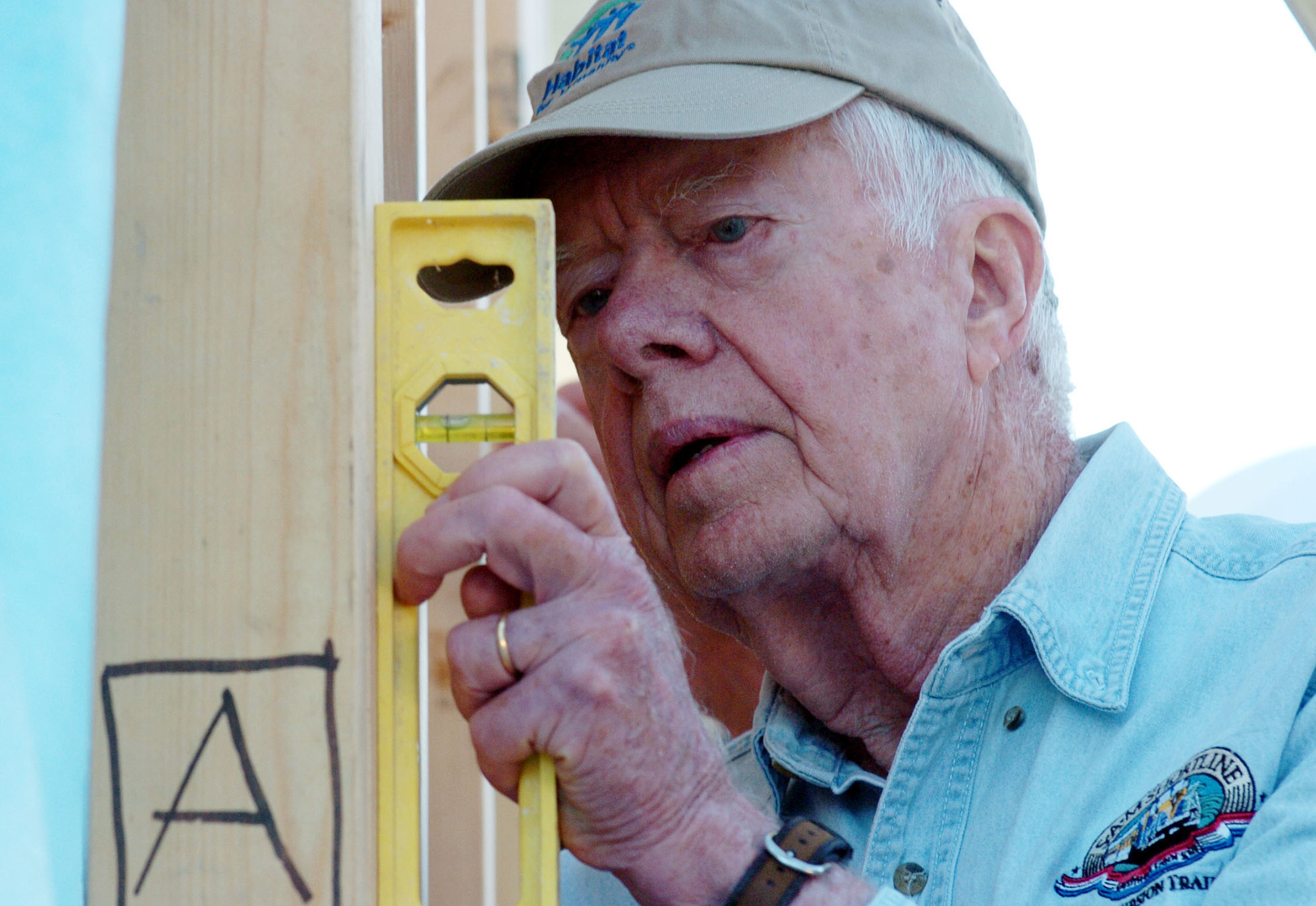 Former president Jimmy Carter takes part in a Habitat for Humanity project in Benton Harbor, Michigan, in 2005. (Photo: R Diamond / WireImage)
Former president Jimmy Carter takes part in a Habitat for Humanity project in Benton Harbor, Michigan, in 2005. (Photo: R Diamond / WireImage)
After his presidency
Returning to Plains, Georgia, after this defeat, it took him some time to find a new purpose for his life ahead, and especially a life beyond Washington and elective politics. Carter sat down and wrote his memoirs and began giving a week a year to build a house for the local humanitarian NGO, Habitat for Humanity. This so helped improve its public standing that the NGO eventually became the largest nonprofit builder of housing in the world. (Such a commitment was taken up by many others around the country and beyond. In fact, in the early 2000s, diplomats like this author also emulated Carter’s example, digging foundations for Habitat for Humanity homes in townships around Johannesburg.)
Rather than follow the easy path of joining corporate boards or giving immensely well-rewarded speeches around the world, by 1982 Carter had determined, as Alter noted, to “build a conference centre to bring peace between warring parties, as he had at Camp David… Over time, the Carter Center, which now employs more than three thousand people (mostly abroad), has allowed its founder to redefine what we expect from our former presidents. Embracing some form of public service is now the rule, not the exception, for (most of) them.”
A search for a comparative
A look at history for any kind of equivalent with other elected leaders forging a post-presidency career is a tough task. While revered figures like George Washington and Nelson Mandela secured their respective nations’ new democratic traditions by declining popular appeals to continue on as presidents, they were certainly not defeated in an election.
By contrast, as a historical comparative, the only American president who, after a defeat for a second term of office, then forged a long, successful post-presidency career, seems to have been John Quincy Adams. Leaving the White House, Adams then won a congressional seat from Massachusetts and achieved lasting honour by his successful defence of the enslaved persons on the ship, the La Amistad.
The ship had been bound for Cuba from Africa, but the slaves on board seized the ship from its Spanish crew and sailed it to America where they were jailed as mutineers. In 1840, Adams successfully defended their right to freedom and a return to Africa with his arguments before the US Supreme Court. The victory became a major incentive for a nascent abolitionist movement.
Since the Carter Center’s inception, some of its most important successes have come in the arena of global public health. But the centre has also been a pioneer in organising election observation efforts, monitoring more than 100 elections in Africa, Latin America and Asia since 1989.
In perhaps its most widely hailed public health effort, the centre announced only 14 human cases of Guinea worm disease had been reported in all of 2021, the result of years of its public health campaigns to improve access to safe drinking water in Africa. The centre has also taken on efforts to deal with river blindness, Ebola and other diseases. Moreover, his wife, Rosalynn Carter, before her own death, had undertaken efforts to end the stigma of mental illness. Jimmy Carter received the Nobel Peace Prize in 2002.
On a more personal level and as a reflection of his deeply felt religious feeling, until a few years before his death, Carter continued teaching weekly Sunday school classes at the Maranatha Baptist Church in Plains. His classes eventually were drawing attendees from around the world, and would-be participants lined up outside the church the night before his class was due to start.
Summing up a life, his biographer, Alter, wrote about Carter: “In recent years, the shortcomings and contradictions of his long life have given way to an appreciation of his core decency. Now, beyond his heavenly reward, we are left with his earthly example: a life of ceaseless effort, not just for himself but for the world he helped shape.”
For this writer, there may be no better way to depict this man’s astonishing life and to honour his contributions than to end with a musical message from two extraordinary singers – Jessye Norman and Kathleen Battle. They offer their voices in the great southern African American spiritual of farewell, In that Great Gettin’ Up Morning.
In that great a-gettin’ up morning,
Fare thee well, fare thee well.
In that great a-gettin’ up morning,
Fare thee well, fare thee well.
As one contemplates the impact and importance of Jimmy Carter’s long life, listen here:
https://www.youtube.com/watch?v=CzF0W1sv26w
This story was originally published in 2023 and updated since the passing of Jimmy Carter on 29 December 2024.




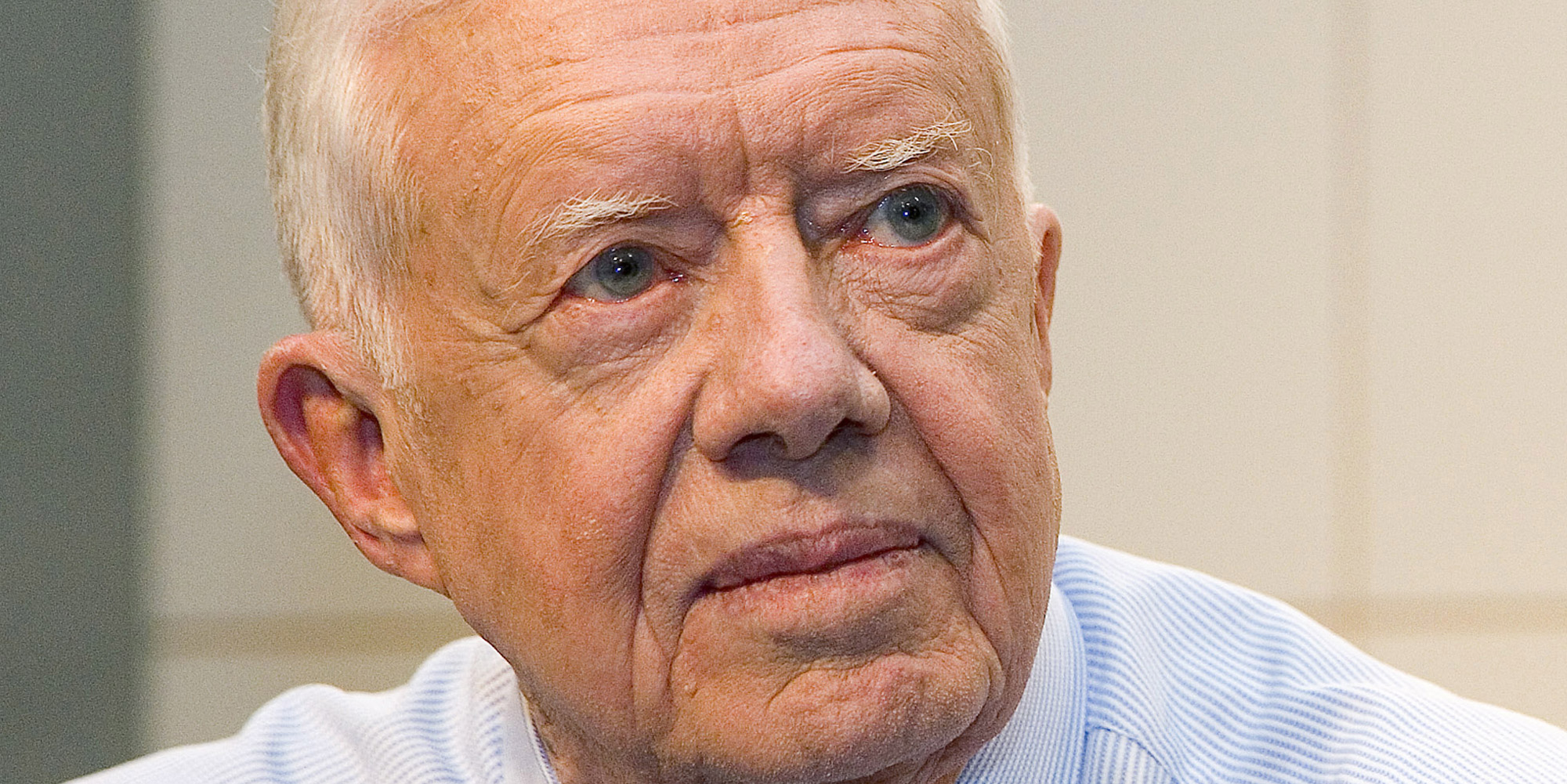 Former President Jimmy Carter during Habitat for Humanity in 2005 at Benton Harbor in Benton Harbor, Michigan, United States. (Photo: R. Diamond / WireImage)
Former President Jimmy Carter during Habitat for Humanity in 2005 at Benton Harbor in Benton Harbor, Michigan, United States. (Photo: R. Diamond / WireImage) 